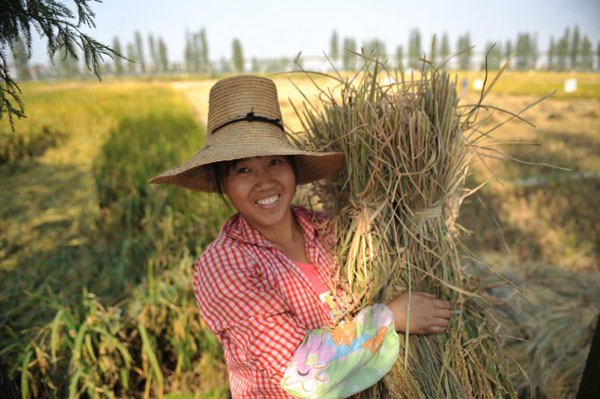 |
|
Photo taken on Oct 19, 2012 shows a farmer harvesting grain in Nanchang, East China's Jiangxi province. [Photo/Xinhua] |
The quarrel between rural villagers who say they have harvested little with super hybrid rice seeds and the seed provider Longping Hightech has a lot to do with not only the reputation of China's hybrid rice but also the credibility of the government.
In October 2014, more than 600 hectares of rice fields in East China's Anhui province planted with super hybrid rice seed Liangyou 0923 witnessed a sharp decline in harvest or had no harvest at all. Local villagers accused the seed provider of concealing the fact that this type of seed has poor resistance against rice blast disease. The seed provider denied the seeds were at fault and claimed poor weather was to blame.
The local seed management authorities responded to this by saying this type of rice seed suffered the most from rice blast under the same weather conditions.
The fact is this type of seed has brought a harvest for villagers for a couple of years. But the output has been declining and has never been nearly as high as the publicity says.
Such a single failure is, of course, hardly enough to deny the advantages of super hybrid rice seeds, which come in many different types. Yet how this incident is handled will be a test of the government's governing capability. It will also be a touchstone of whether a high-tech seed company will be able to survive a crisis of trust.
It goes without saying that a thorough investigation headed by experts and officials from the Ministry of Agriculture is badly needed. It needs to find out how much the seed has contributed to the harvest failure. If it is villagers' poor farming practices that are the cause, they need to be told about it with convincing evidence.
No doubt the villagers will give a vote of no confidence to the company by choosing another seed this year.
Yet if this type of seed does indeed have poor resistance against rice blast, acknowledging it would do the company no harm; if it compensated the villagers for their economic losses, it would win the trust of villagers instead. And doing so and working to improve the disease resistance of the seeds would make the company a winner in the long run.
Otherwise if the villagers' claim is true the company's credibility will suffer and so too will the government's.